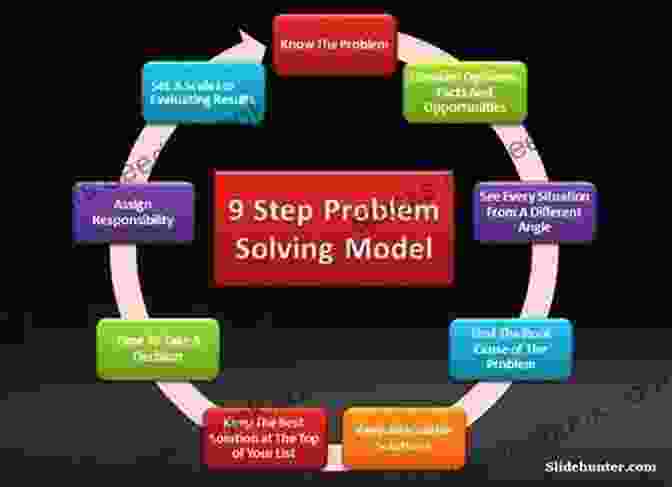The Developmental Ecological Problem Solving Model: Consultation, Supervision, and Training

The Developmental Ecological Problem Solving Model (DEPS) is a comprehensive framework for understanding and addressing the complex problems that children and families face. DEPS is based on the idea that children's development is influenced by a variety of factors, including their individual characteristics, their family and community environment, and the broader social and cultural context. DEPS provides a structured approach to problem solving that takes into account all of these factors.
History of DEPS
DEPS was developed by Dr. Urie Bronfenbrenner in the 1970s. Bronfenbrenner was a psychologist who was interested in understanding how children's development is influenced by their environment. He developed DEPS as a way to organize and understand the complex factors that affect children's development.
4.1 out of 5
| Language | : | English |
| File size | : | 6811 KB |
| Text-to-Speech | : | Enabled |
| Screen Reader | : | Supported |
| Enhanced typesetting | : | Enabled |
| Word Wise | : | Enabled |
| Print length | : | 356 pages |
Theoretical Foundations of DEPS
DEPS is based on the following theoretical foundations:
- The ecological perspective: DEPS views children's development as taking place within a series of nested environments, or "systems." These systems include the microsystem (the child's immediate environment, such as their family and school),the mesosystem (the interactions between the child's microsystems),the exosystem (the settings that indirectly influence the child's development, such as the workplace or extended family),and the macrosystem (the cultural and social context in which the child lives).
- The developmental perspective: DEPS emphasizes that children's development is a lifelong process. It is influenced by both the child's own characteristics and the environment in which they live.
- The problem-solving perspective: DEPS provides a structured approach to problem solving that takes into account all of the factors that affect children's development. It involves identifying the problem, gathering information, developing and implementing a plan, and evaluating the results.
Practical Applications of DEPS
DEPS can be used to address a wide range of problems that children and families face. These problems can include:
- Behavioral problems
- Academic problems
- Social problems
- Mental health problems
- Family problems
DEPS can be used by a variety of professionals, including:
- Psychologists
- Social workers
- Counselors
- Teachers
- Parents
Consultation, Supervision, and Training in DEPS
Consultation, supervision, and training are essential components of DEPS. Consultation involves working with other professionals to develop and implement a plan to address a child's problem. Supervision involves providing ongoing support and guidance to professionals who are using DEPS. Training involves teaching professionals how to use DEPS.
Consultation, supervision, and training can help professionals to use DEPS effectively to address the complex problems that children and families face. These services can help professionals to:
- Understand the theoretical foundations of DEPS
- Apply DEPS to a variety of problems
- Develop and implement effective intervention plans
- Evaluate the results of their interventions
DEPS is a comprehensive and effective framework for understanding and addressing the complex problems that children and families face. Consultation, supervision, and training are essential components of DEPS. These services can help professionals to use DEPS effectively to improve the lives of children and families.

References
- Bronfenbrenner, U. (1979). The ecology of human development: Experiments by nature and design. Cambridge, MA: Harvard University Press.
- Bronfenbrenner, U. (1986). Ecology of the family as a context for human development: Research perspectives. Developmental Psychology, 22(6),723-742.
- Bronfenbrenner, U. (1995). Developmental ecology through space and time: A future perspective. Developmental Psychology, 31(5),618-630.
4.1 out of 5
| Language | : | English |
| File size | : | 6811 KB |
| Text-to-Speech | : | Enabled |
| Screen Reader | : | Supported |
| Enhanced typesetting | : | Enabled |
| Word Wise | : | Enabled |
| Print length | : | 356 pages |
Do you want to contribute by writing guest posts on this blog?
Please contact us and send us a resume of previous articles that you have written.
 Novel
Novel Page
Page Chapter
Chapter Text
Text Story
Story Genre
Genre Paperback
Paperback E-book
E-book Magazine
Magazine Newspaper
Newspaper Shelf
Shelf Glossary
Glossary Bibliography
Bibliography Foreword
Foreword Synopsis
Synopsis Footnote
Footnote Manuscript
Manuscript Scroll
Scroll Codex
Codex Tome
Tome Library card
Library card Biography
Biography Autobiography
Autobiography Reference
Reference Encyclopedia
Encyclopedia Dictionary
Dictionary Thesaurus
Thesaurus Character
Character Resolution
Resolution Card Catalog
Card Catalog Stacks
Stacks Study
Study Lending
Lending Reserve
Reserve Study Group
Study Group Awards
Awards Reading List
Reading List Book Club
Book Club Theory
Theory Textbooks
Textbooks Imogen Paige
Imogen Paige Nicole C Engard
Nicole C Engard Jutta Profijt
Jutta Profijt Adriana Kritter
Adriana Kritter Brooke Binkley
Brooke Binkley Julian Bound
Julian Bound Janet Evanovich
Janet Evanovich Amanda Haas
Amanda Haas Professor Beaver
Professor Beaver Christa Craven
Christa Craven Ray Higdon
Ray Higdon Michael D Toth
Michael D Toth Brad Stephenson
Brad Stephenson Gerald Milnes
Gerald Milnes Richard Lawry
Richard Lawry Connie Kerbs
Connie Kerbs Nicholas Ruggiero
Nicholas Ruggiero Brain School
Brain School Charles Christopher Camosy
Charles Christopher Camosy Roger Kropf
Roger Kropf
Light bulbAdvertise smarter! Our strategic ad space ensures maximum exposure. Reserve your spot today!

 Denzel HayesUnveiling the Tapestry of Nigerian Poetry: A Comprehensive Exploration of Its...
Denzel HayesUnveiling the Tapestry of Nigerian Poetry: A Comprehensive Exploration of Its...
 Nick TurnerAn Easy Guide to Exploring the Top Attractions, Food Places, and Local Life...
Nick TurnerAn Easy Guide to Exploring the Top Attractions, Food Places, and Local Life... James HayesFollow ·14.3k
James HayesFollow ·14.3k Dwight BellFollow ·15.8k
Dwight BellFollow ·15.8k Drew BellFollow ·2.5k
Drew BellFollow ·2.5k Colt SimmonsFollow ·13.2k
Colt SimmonsFollow ·13.2k Kelly BlairFollow ·5.2k
Kelly BlairFollow ·5.2k Mario BenedettiFollow ·3.8k
Mario BenedettiFollow ·3.8k Ernest J. GainesFollow ·5.7k
Ernest J. GainesFollow ·5.7k Preston SimmonsFollow ·7.2k
Preston SimmonsFollow ·7.2k

 Amir Simmons
Amir SimmonsMore Zeal Than Discretion: A Closer Look at the Risks and...
Enthusiasm is often seen as a positive...

 Wayne Carter
Wayne CarterYear of the Dog: American Poets Continuum 178
Year of the Dog is a...

 David Foster Wallace
David Foster WallaceThe Constitution of the State of New York: A...
The Constitution of the...

 Harvey Bell
Harvey BellSmall Cetaceans of Japan: Exploitation and Biology
Small cetaceans, including...

 Blake Bell
Blake BellEffortless Elegance: A Comprehensive Guide to Captivating...
In the realm of crocheting,...
4.1 out of 5
| Language | : | English |
| File size | : | 6811 KB |
| Text-to-Speech | : | Enabled |
| Screen Reader | : | Supported |
| Enhanced typesetting | : | Enabled |
| Word Wise | : | Enabled |
| Print length | : | 356 pages |










